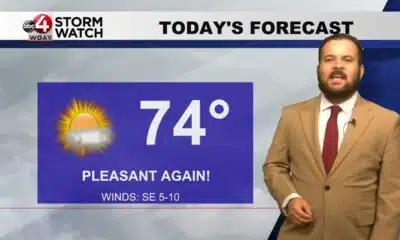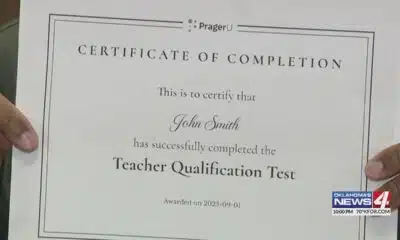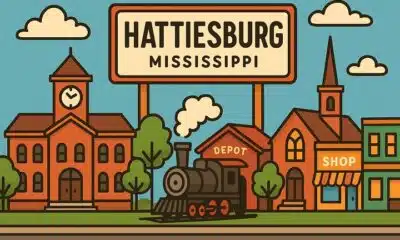News from the South - Florida News Feed
Florida legislators want to protect phosphate giant from suits over radioactive land
by Craig Pittman, Florida Phoenix
May 1, 2025
When I was a kid growing up in Pensacola, I’d come home from school and immediately turn on “The Big Show” on WKRG-TV. The avuncular host, Max Goodman, showed a lot of ’50s monster movies, and that’s where I learned about the transformative power of radioactivity.
Those movies taught me that radiation can make a normal-sized octopus into a sucker-armed giant (“It Came from Beneath the Sea,” 1955). It can turn a lot of little ants into a really big insect army (“Them!” 1954). It can even make an average guy grow into the tallest, strongest man on earth (“The Amazing Colossal Man,” 1957)!
So you can imagine how happy I was to hear about Senate Bill 832. This bill will make it far more likely that Central Florida’s new residents wind up living on top of radioactive waste that will turn them and their household insects colossal.
Picture how big the flying cockroaches will get. Won’t that be fun?
Members of the Florida Senate and House sure seem to think so. The Senate voted 33-3 to approve the bill two weeks ago. Then the House voted 80-20 to pass it last week. However, the House version differs from what passed the Senate and, as of Wednesday afternoon, the Senate had rejected the House version and sent it back to the lower chamber.
Perhaps, on this return trip, someone will ask them what the heck they think they’re doing.
My colleague Mitch Perry wrote about this bill for the Florida Phoenix in March, when the bill, sponsored by Sen. Danny Burgess passed the Senate Judiciary Committee. He reported that it “would provide new legal protections to companies that mine phosphate in Florida and leave behind radioactive spoils.”
Yeah, the largest phosphate company in the world, Tampa-based Mosaic, needs protection from being sued. From what I’ve seen, Mosaic needs protection about as much as the Amazing Colossal Man did.
A weekly X-ray
I first heard about this bizarre bill’s impending passage from Glenn Compton of the venerable environmental group ManaSota-88.
“It’s not a good idea to have residents living on top of this,” he told me. “It’s not a good idea to build houses on these properties.”
Yet we’ve built thousands of them.
Some people contend that being exposed to radiation is not the magical shortcut to greater size and strength that those ’50s movies led me to believe. In fact, it’s actually bad, because it causes cancer.
That’s the argument of the attorneys suing Mosaic on behalf of some Mulberry homeowners. Their mobile homes in Anglers Green and the ironically named Paradise Lakes sit on land where Mosaic once mined, then piled the dirt back on top when they were done.
Because no one warned them, the buyers of these lots had no idea it was polluted property when they sank their money into it, the suit says. Then family members fell ill.
“The ground and soil that support and form the very foundation upon which [the plaintiffs’] homes sit is contaminated with uranium and radium-226 caused by Mosaic’s phosphate mining operations,” the 2020 lawsuit says.
For years, Mosaic has been all over TV with ads bragging about their commitment to Florida’s environment. Meanwhile, though, the company has been leaving cancer-causing contaminants behind on the land that’s been mined and then “reclaimed”.
Mosaic digs deep into the ground for the phosphate rocks that it needs, exposing radioactive soils that had been hidden 20 or more feet below the surface. Humans were safe from the radiation while the soil was buried. But when Mosaic covers the holes back up to sell to developers, the radioactive material winds up on the surface.
“Exposure to levels of radiation similar to those identified in the Angler’s Green and Paradise Lakes communities,” the suit contends, “translates to residents receiving over one chest X-ray per week — with obviously no diagnostic or health purpose whatsoever.”
I talked to two of the attorneys representing the homeowners, Ryan Ellis and Chris Nidel. They told me that Burgess’ phosphate bill is clearly aimed at protecting Mosaic from their lawsuit, which has so far survived all the company’s efforts to persuade a judge dismiss it.
“It’s just hurdle after hurdle to prevent them from being sued,” Nidel told me. If it passes, “Mosaic is in the end zone about to declare victory.”
This affects more than just their clients, the attorneys told me. The U.S. Environmental Protection Agency has found widespread Central Florida development atop old phosphate mine locations.
“They found 50,000 people living on these sites,” Nidel told me. “There’s acres and acres of them.”
He mentioned that one former mine was disguised as a park for riding mountain bikes. “They’re radioactive waste pits and now people are riding around in them.”
Something the Legislature should know
The Mulberry homeowners weren’t the first to sue over their contaminated land. In 2017, residents of Lakeland’s Oakbridge and Grasslands communities sued the developer who built their homes on top of old mining properties.
They settled the suit last year but, in announcing the settlement, their law firm pointed out, “EPA testing before development of the subdivisions showed radiation levels 11 to 21 times higher than the acceptable risk limit.” The builder went ahead anyway.
I heard about that 2017 case from Rachael Curran of the Jacobs Public Interest Law Clinic for Democracy and the Environment at Stetson University’s College of Law.
“I have no idea how many homes are presently built [or] planned to be built on reclaimed lands in Florida,” Curran told me. “That’s something the Legislature should know before it limits recoverable damages for these exposed Floridians.”
But our fine lawmakers aren’t interested in those kinds of numbers. They only care about the numbers on Mosaic’s campaign contributions.
Independent journalist Jason Garcia, who wrote about this bill in February, noted that Mosaic has hired half a dozen lobbyists to push Burgess’ bill.
He also pointed out that “Mosaic has been cutting large checks to key lawmakers this month — including a $10,000 donation to Burgess that was deposited four days before the senator filed his bill to help Mosaic.”
In defending his bill before the Senate Environment and Natural Resources Committee last month, Burgess called it “a necessary piece of legislation, with a naturally occurring geological feature in the state of Florida.”
Not a single senator voted against it.
Playing havoc with ecosystems
The quest for phosphate rock didn’t start with Mosaic. Miners seeking the ancient rock used for making fertilizer have been ripping up the Florida landscape for more than a century.
In 1889, a man named Albertus Vogt — a onetime Confederate soldier with an impressive mustache and a curious marital history — noticed, in a spring near Dunnellon, some prehistoric fossils.
Vogt recalled similar fossils turning up near phosphate deposits in South Carolina and hired someone to dig. Sure enough, the Florida fossils turned out to be a sign of extensive phosphate, the remnants of prehistoric animals.
What happened next was like the California gold rush, but without the frequent gunplay, the Mark Twain stories, and, of course, the bullion.
“News of this great find spread,” the Phosphate Research Institute reports. “Thousands of prospectors and speculators flooded the area and the great Florida phosphate boom had begun. By 1894 more than 215 phosphate mining companies were operating statewide.”
Now there are 28 phosphate mines in Florida, covering more than 450,000 acres, according to the Department of Environmental Protection. Eleven phosphate mines are currently active, and a series of corporate mergers have led to Mosaic becoming nearly the last miner standing.
Drive through the part of Central Florida known as Bone Valley and you’ll see the strange creations that mark the location of the mines and processing plants: Massive mounds of waste known as phosphogypsum stacks, often the highest point for miles around. Each one has a huge pond of acidic water pooled on top.
The other thing that marks these industrial sites: a series of disasters that have plagued the industry and repeatedly played havoc with our ecosystems.
In 1994, a sinkhole opened up beneath a stack in Mulberry that was so big, local wags later dubbed it the new Disney World ride, “Journey to the Center of the Earth.” The hole measured 160 feet across and about 400 feet deep and its sudden appearance dropped at least 2 million gallons of acidic wastewater down into the Floridan Aquifer.
In 1997 a dam atop a gypsum stack at a Mulberry Phosphates fertilizer plant broke during heavy rains, spilling 56 million gallons of acidic wastewater into the Alafia River. As the pollution flowed downriver, everything in the 42 miles between Mulberry and Tampa Bay was killed, including more than 1 million fish. The company declared bankruptcy and shut down.
Seven years later, in 2004, something similar happened. Tropical Storm Frances broke the dam atop a gypsum stack at Mosaic’s Riverview plant, sending 65 million gallons of the acidic waste into a creek that flowed into Hillsborough Bay. The pollution killed fish, mangroves, and seagrass.
Then, in 2016, less than 2 miles from where the 1994 sinkhole occurred, another sinkhole opened beneath a Mosaic gypsum stack. This hole wound up being 45 feet wide and 220 feet deep. Down went 215 million gallons of acidic water, gurgling into the aquifer that supplies the region’s drinking supply.
And I haven’t even mentioned Mosaic’s $2 billion settlement with the EPA, which a government spokesman called “the most significant enforcement action in the mining and mineral processing arena” in the U.S.
Or the horrific Piney Point disaster, which resulted from Florida environmental regulators repeatedly bending the rules to accommodate industry.
Save Mosaic!
Yet our legislators treat the phosphate industry like it’s a miner celebrity (ba-dum-bum!), not a major polluter.
I picture them wandering the marble halls of the Capitol like that misinformed high school kid in “Ferris Bueller’s Day Off,” who was carrying a Pepsi can full of change and calling out “Save Ferris!” Instead, they’re chanting, “Save Mosaic!” and collecting legislation to help the company succeed.
The company wants to use its radioactive waste to build roads? Sure, no problem! Happy to help!
How about we also spend $20 million of taxpayer dollars to research using those gypsum stacks as a source of rare earth metals? Sure, no sweat!
And now they’re ready to build a wall around Mosaic’s bank account so not a single cancer-stricken mobile home resident can get at it.
But it’s not just the trailer park folks who’d be blocked from getting any of Mosaic’s moolah.
In 2013, Mosaic took one of its Polk County phosphate mines that had played out in the 1960s and converted it into a 36-hole golf resort called “Streamsong.” Two years ago, the company sold Streamsong to a Chicago sports management business for $160 million.
I sure hope they warn all the golfers to wear hazmat suits when they tee off.
The backup plan
I tried repeatedly to get Mosaic officials to comment on their use of the Legislature to make an end-run around their losing battle in the courts.
For some reason, they were too busy to respond my questions. Perhaps they were preparing medical bills to send to those lucky Mulberry mobile homeowners getting all the free X-rays.
Meanwhile, fearing the Burgess bill might not make it across the finish line before the legislative session ended, the Florida Senate came up with a backup plan.
The pertinent content of the “Save Mosaic” bill was added as an amendment to SB 492, which has to do with wetlands destruction, which is also something Mosaic is good at. It has passed both the House and Senate unanimously.
Because they’ve doubled the company’s chances of success, it’s likely one of these bills makes into law. That would end any further legal challenge to Mosaic’s failure to clean up its mess
According to those ’50s movies, that means we should look for a lot of colossal basketball and football players coming from the high schools built on top of the formerly mined lands. Buying their clothes could be tricky. I’d recommend investing heavily in Spandex.
If you’re considering buying any Bone Valley property, you should definitely ask your realtor if it used to be at the bottom of a ginormous phosphate mine.
And if you know anyone who’s just purchased a home there, remember that the best housewarming gift is probably a Geiger counter.
YOU MAKE OUR WORK POSSIBLE.
Florida Phoenix is part of States Newsroom, a nonprofit news network supported by grants and a coalition of donors as a 501c(3) public charity. Florida Phoenix maintains editorial independence. Contact Editor Michael Moline for questions: info@floridaphoenix.com.
The post Florida legislators want to protect phosphate giant from suits over radioactive land appeared first on floridaphoenix.com
Note: The following A.I. based commentary is not part of the original article, reproduced above, but is offered in the hopes that it will promote greater media literacy and critical thinking, by making any potential bias more visible to the reader –Staff Editor.
Political Bias Rating: Left-Leaning
This content critiques legislation favored by the phosphate industry and Florida lawmakers that appears to shield large corporations from legal responsibility for environmental and public health harms. It highlights environmental damage, public health risks, corporate lobbying influence, and lawmakers’ apparent prioritization of industry interests over community safety. The tone is skeptical and critical of corporate power and conservative-leaning legislative actions while emphasizing environmental protection and accountability, which aligns with a left-leaning political perspective.
News from the South - Florida News Feed
Rudy Giuliani leaves the hospital after being injured in a car crash in New Hampshire
SUMMARY: Rudy Giuliani, 81, was released from the hospital after a car accident in New Hampshire where the vehicle he was in was struck from behind on Interstate 93. Giuliani sustained a fractured thoracic vertebra, multiple lacerations, contusions, and injuries to his left arm and leg. He and the driver, spokesman Ted Goodman, were helping a woman who reported a domestic violence incident when the crash occurred. Both suffered non-life-threatening injuries. The crash’s cause is under investigation, with no charges filed. Giuliani, known as “America’s mayor” for his 9/11 leadership, later served as Trump’s personal attorney, involved in controversial election fraud claims.
The post Rudy Giuliani leaves the hospital after being injured in a car crash in New Hampshire appeared first on www.news4jax.com
News from the South - Florida News Feed
Polls to open in Florida Senate, House special elections. How to find out if you should be voting
SUMMARY: Election Day in west Orange County, Florida, on Tuesday features special elections to fill two Florida Legislature vacancies in Senate District 15 and House District 40. Senate District 15 includes northwest Orange County areas like Winter Garden and College Park. The seat was vacated by the late Sen. Geraldine Thompson. Democratic State Rep. Bracy Davis faces Republican Willie J. Montague for the Senate seat. In House District 40, RaShon Young, Davis’ former chief of staff, won the Democratic primary and will compete against Republican Tuan Le and write-in Chris Hall in the Sept. 2 general election. Polls open 7 a.m.–7 p.m.; vote-by-mail ballots are due by 7 p.m.
The post Polls to open in Florida Senate, House special elections. How to find out if you should be voting appeared first on www.clickorlando.com
News from the South - Florida News Feed
Here’s what we know about COVID shots in Florida
SUMMARY: In Florida, confusion grows over COVID-19 vaccine access. Jen, a Tampa resident with an underlying condition, struggles to find vaccination sites despite consistent annual shots. Pharmacies like CVS now require prescriptions for vaccines in 16 states, including Florida, while Walgreens limits availability. The FDA approved the 2025/26 vaccine mainly for those 65+, requiring high-risk younger individuals to have prescriptions. Florida Surgeon General Dr. Joseph Ladapo opposes the vaccine, calling it unsafe. This hesitancy contrasts federal messages supporting choice, as CDC advisory meetings may soon clarify guidelines amid politicized debates. Many Floridians remain uncertain about vaccine availability and eligibility.
The post Here’s what we know about COVID shots in Florida appeared first on www.tampabay28.com
-
Mississippi Today2 days ago
DEI, campus culture wars spark early battle between likely GOP rivals for governor in Mississippi
-
Mississippi Today6 days ago
Judge: Felony disenfranchisement a factor in ruling on Mississippi Supreme Court districts
-
News from the South - North Carolina News Feed5 days ago
Parasocial party: Why people are excited for the Taylor Swift, Travis Kelce engagement
-
News from the South - Louisiana News Feed5 days ago
K+20: Katrina alters local health care landscape, though underlying ills still the same
-
Our Mississippi Home7 days ago
Katrina Remembered: A Hattiesburg Perspective
-
Mississippi News Video7 days ago
Today’s First Alert Weather Kid is Karson (8/26)
-
Local News7 days ago
Parents of missing 7-month-old California boy are charged with murder
-
Our Mississippi Home6 days ago
The Great Backyard Recovery – Helping Birds After the Storm









































